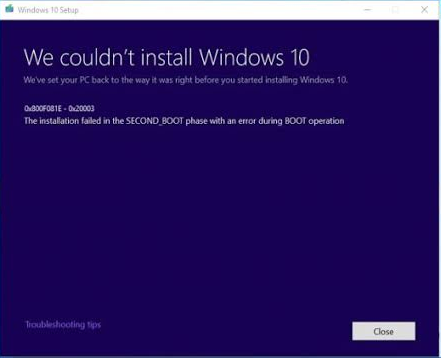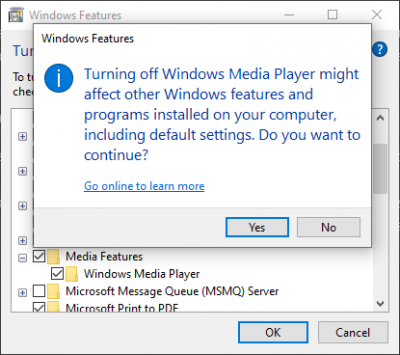The error 0x800F081E – 0x20003 is a Windows status code for CBS E NOT APPLICABLE, which essentially means that an update requirement is missing or the files that are already installed are already of a higher version than the ones that are pending. You may face this error during Windows Upgrade – especially when you try to upgrade earlier versions of Windows 11/10 N edition to a later version.
0x800f081E-0x20003, The installation failed in the SECOND_BOOT phase with an error during BOOT operation

Microsoft distributes special “N” editions of Windows in Europe and “KN” editions of Windows in Korea. These are the same as the standard editions of Windows, except they don’t include Windows Media Player and other multimedia playback features. Now, when the upgrade fails with the error message and code in the screenshot above, the installation wizard doesn’t provide you with additional information on why the update couldn’t be installed.
Fix error 0x800F081E on Windows 11/10
Windows uses generic error codes so, if you see error 0x800f081e, you need to first check the error log.
To do this, navigate to the following location on your PC and check the TXT file named setuperr.log with a text viewer/editor like Notepad:
C:$WINDOWS.~BT\Sources\Panther\
From the report, towards the ending of the log file, you will notice something similar-
C:\WINDOWS\SoftwareDistribution\Download\80b2677d6e15a2a206625bb25a7124fe\amd64_Microsoft-Windows-MediaPlayer-Package~~AMD64~~10.0.17134.1. Error: 0x800F081E 2019-09-10 20:26:57, Error SP Operation failed: Add [1] package C:\WINDOWS\SoftwareDistribution\Download\80b2677d6e15a2a206625bb25a7124fe\amd64_Microsoft-Windows-MediaPlayer-Package~~AMD64~~10.0.17134.1. Error: 0x800F081E[gle=0x000000b7]
From the above lines, it becomes apparent that the update is unable to complete successfully because of the Windows Media Player package. The log file may contain other error messages and other error codes. If error 0x800f081e is listed, then you can fix the issue with the steps given below.
To fix the problem, you’ll have to uninstall the Media Feature Pack, that you may have installed on your PC – or if you’re running Windows N, the pack comes preinstalled. Then try the upgrade, and when it completes, reinstall the pack back again.
To uninstall the Media Feature Pack, do the following:

- Press Windows key + R to invoke the Run dialog box.
- Type optionalfeatures.exe and hit Enter to open the Windows Features wizard.
- Wait until the Windows Features list populates, then click on +sign to collapse the Media Features folder.
- From the Media Features folder, uncheck Windows Media Player.
- Click Yes and then OK to save the changes.
- Exit the Windows Features dialog, reboot your computer.
On boot, try to run the upgrade process via Windows Update.
If the installation completes successfully, return to Windows Features and re-enable Windows Media Player. If you’re using Windows 10 N Edition (or KN Edition), you can download and install the latest Media Feature Pack for your Windows N or KN edition.
You may also run the Windows Update Troubleshooter and see if that helps you.
Note: You have the option of performing an in-place upgrade, if the installation via Windows Update still fails, before reinstalling the Media feature pack.
Leave a Reply